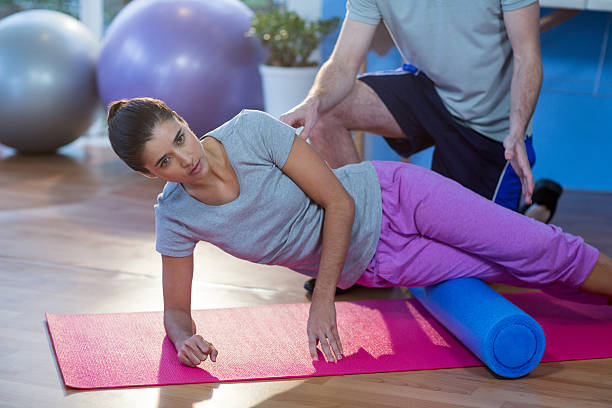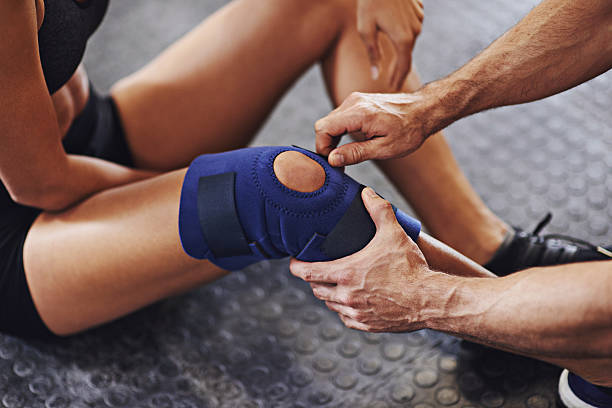
Getting back into exercise after an injury
Getting back into shape after suffering an injury is no straight road. While an improvement to your physical condition is important, it’s only the first step towards recovery. For many people, the biggest challenge lies in overcoming those mental hurdles. The fear of reinjury can stop you in your tracks, and it can be difficult to know when it’s safe to start moving again.
Nonetheless, using the correct form protects your body from further injury. Not only that, but it can also help you achieve superior exercise performance and fitness results. There are many benefits to introducing a controlled combination of aerobic, strengthening, and balancing exercises (like clinical pilates). Just make sure you listen to your body (not to mention your physiotherapist) before diving headfirst into your former routine.
Set realistic fitness goals
“Strain yourself, or push too hard, and you’ll run the risk of developing a chronic injury…”
Being sedentary is no way to go about improving your health and wellbeing—but nor is over-exerting yourself. You need to think long-term about your physical goals in order to give yourself the best chance of a full recovery. Commitment to rehabilitation is integral to gaining back your motion and strength, and it’s important to take your physiotherapists’ advice seriously.
Establishing realistic fitness goals minimises the risk of further impairment and helps you adhere to a long-term program. [1] Strain yourself, or push too hard, and you’ll run the risk of developing a chronic injury—posing a far greater threat to your fitness than taking it easy. Even the minimums of exercise can lead us to improvement.

Mentally prepare yourself
“Addressing the psychological aspects relevant to your recovery is essential…”
There’s no doubt a premature rebound can upset the physical recovery, but the psychological implications of pushing too hard, too soon, can also be significant. Research suggests a lack of confidence to be one of the ruling barriers for many people who’ve suffered an injury. [2] A physiotherapist can assist you in becoming actively involved in the rehabilitation process. Addressing the psychological aspects relevant to your recovery is essential to managing your injury and the changes to your routine. [3] Once you’ve learned to confront the blockades of the mind, you can start to enjoy the many physical benefits of exercise, including elevated mood, increased cognitive functioning, and improved self-esteem.
Consult a physiotherapist
“…there’s no blanket timeframe when it comes gaining your strength back.”
Supporting your body with the right technique should be your utmost priority. When it comes to controlled physical outcomes, your physiotherapist will be the best person to make recommendations. They have the clinical reasoning skills needed to provide optimal and individualised exercise therapy in a modified capacity. [4]
Remember, there’s no blanket timeframe when it comes gaining your strength back. If you want to give your body the best chance of a swift recovery, ask your physio to guide you through the movements and correct form. Maintaining good body alignment is integral to supporting your joints and ligaments, as well as rebuilding your strength and improving your mobility.

At Bangalow Physiotherapy, we offer individual rehabilitation and clinical exercise programs to help kick-start your fitness goals. Our programs are specifically designed to help with the improvement, as well as the ongoing maintenance and self-management of your injury. If you have any queries or would like to schedule an appointment, phone 02 6687 2330 or submit an online enquiry.
References
1. Callahan, L.F., Mielenz, T., Freburger, J., Shreffler, J., Hootman, J., Brady, T., Buysse, K. and Schwartz, T., 2008. A randomized controlled trial of the people with arthritis can exercise program: symptoms, function, physical activity, and psychosocial outcomes. Arthritis Care & Research: Official Journal of the American College of Rheumatology, 59(1), pp. 92-101.
2. Daly, J.M., Brewer, B.W., Van Raalte, J.L., Petitpas, A.J. and Sklar, J.H., 1995. Cognitive appraisal, emotional adjustment, and adherence to rehabilitation following knee surgery. Journal of Sport Rehabilitation, 4(1), pp. 23-30.
3. Ardern, C.L., Taylor, N.F., Feller, J.A., Whitehead, T.S. and Webster, K.E., 2013. Psychological responses matter in returning to preinjury level of sport after anterior cruciate ligament reconstruction surgery. The American journal of sports medicine, 41(7), pp. 1549-1558.
4. Taylor, N.F., Dodd, K.J., Shields, N. and Bruder, A., 2007. Therapeutic exercise in physiotherapy practice is beneficial: a summary of systematic reviews 2002–2005. Australian Journal of Physiotherapy, 53(1), pp. 7-16.

Recent Comments